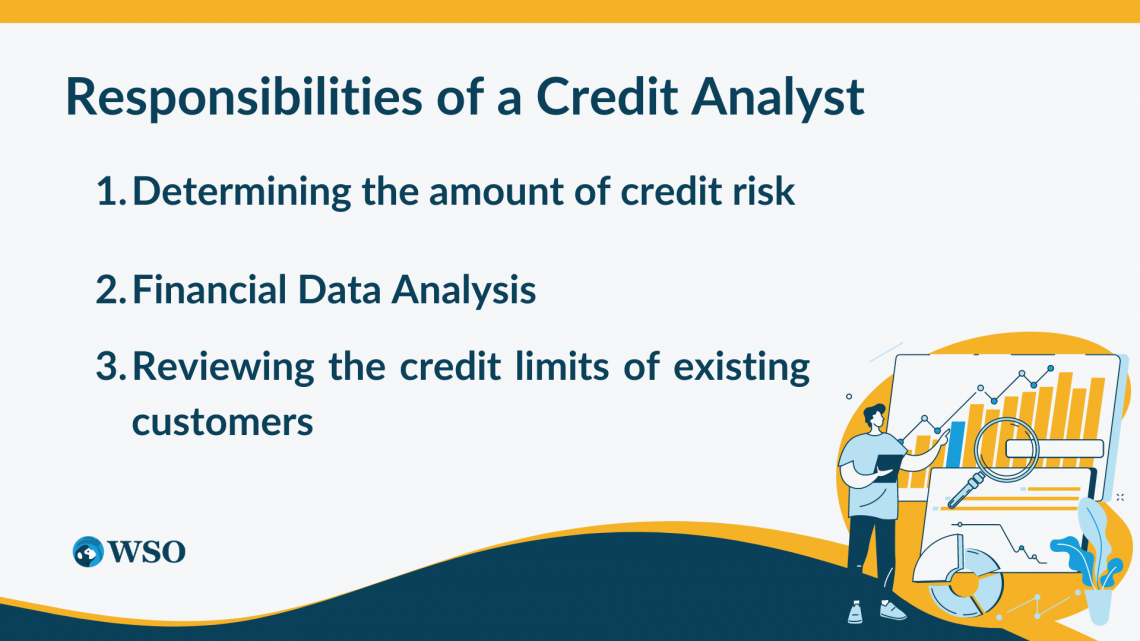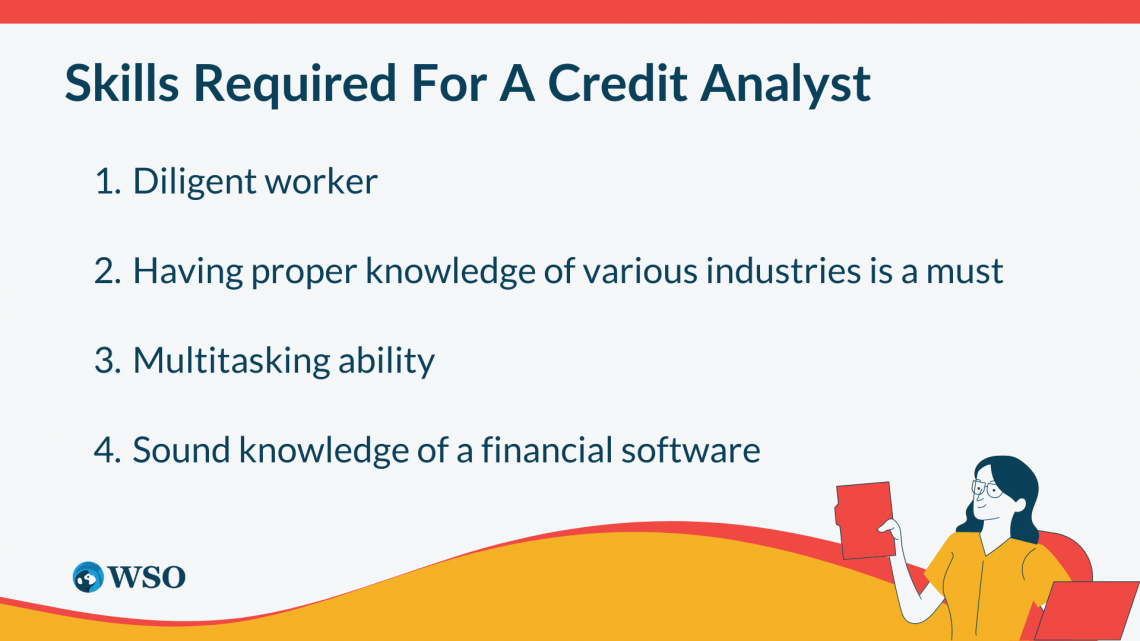Credit Analyst Tasks
Credit analysis measures the ability of the loan issuer to meet the debt obligations
Credit analysis is a financial analysis of companies, firms, governments, or any other debt-issuing organization performed by an investor or bond portfolio management. Credit analysis measures the ability of the loan issuer to meet the debt obligations.

In other words, credit analysis is a method adopted by debt-issuing organizations to ensure the borrower's eligibility to meet their financial obligations. It is a method to validate whether a company is in a condition to pay back the previously issued loan.
It helps to determine the probability of defaulting on a loan before lending money to the borrower. It also helps to analyze the nature of losses if the borrower defaults. When a business defaults, it cannot make its loan repayments.
Credit analysis helps determine the optimum debt at which a company would default based on the financial condition, cost-to-profit ratio, and balance sheet. It enables the debt-issuing organizations to prevent any financial loss if the firm they invested in or lent money to defaults.
The debt-issuing organizations use credit analysis to analyze whether it is safe to issue debt to a particular entity and estimate the amount of money they should lend depending on the borrowing entity's financial condition and past financial and credit history.

The job of a credit analyst when analyzing a client's financial health is to collect essential financial information and evaluate it using financial ratios.
To do so, they compare these financial ratios with the standard industry benchmark to determine if the client's cash flow is sufficient to repay the loan.
The credit analysts then recommend these facts and figures to the underwriter, who decides whether to lend a loan and the debt amount sanctioned based on the analyst's intelligence.
Key Takeaways
- Credit analysis is a financial analysis of companies, firms, or any other debt-issuing organization performed by an investor or bond portfolio management.
-
Credit analysis determines the optimum debt amount at which a company would default based on the financial condition of the company.
-
Credit analysis helps the investors or the debt-issuing organizations to predict the probability that a borrower would default on a loan. It also helps the investors assess the losses' severity if the borrower defaults.
Responsibilities of a Credit Analyst
Credit rating agencies and other credit lending organizations hire credit analysts to analyze credit risk.

Their responsibility is to examine and assess their client's financial standing to assess the risk involved in making loans to them and to provide suggestions to the company. Following are some of the jobs and duties of a credit analyst:
1. Determining the amount of credit risk
One of the jobs of a credit analyst is to analyze the credit risk associated with a client or customer by assessing their earnings and savings information, debt repayment history, and spending.
After analyzing these, the analyst makes recommendations to the company on whether it is safe to provide credit to the client based on his intelligence and understanding.

A credit card-issuing company's credit analyst is tasked with evaluating customers' financial health and making recommendations regarding their credit card status.
It could include approving the application for a new card, denying it altogether, or reducing the credit limit for existing clients. Ultimately, the decision rests on the analysis conducted by the credit analyst.
2. Financial Data Analysis
Commercial and credit banks hire credit analysts to analyze financial data. The analyst's job is to assess the client's loan payment history, assets, liabilities, and earning sources to determine their credit eligibility.
If the borrowing entity is a company, the credit analyst has to evaluate the audited annual report, financial statements, business data, market capital, and management accounts to analyze the company's financial health and determine their eligibility to get the credit and the amount of credit.
A credit analyst also assesses the risk associated with a client to ensure that the debt-issuing authority is financially safe if the client defaults on the loan.
NOTE
The lender relies on the intelligence and analysis of the credit analyst while deciding to approve or reject the credit facilities, depending on the risk associated.
3. Reviewing the credit limits of existing customers
A credit analyst is also responsible for reviewing and analyzing the credit limits of existing clients to determine if they are eligible for an increase in their credit limit based on their repayment history, earning sources, and any defaulting history.
The credit analyst is responsible for collecting relevant financial data from the client and evaluating their ability to fulfill financial obligations. They then create a report on the client's current financial condition. The debt-issuing organization will decide whether to increase or decrease the credit limit.
Educational Qualifications of a Credit Analyst
Credit risk analysis deals a lot with numbers, so it requires a strong background in finance. To get a credit analyst job, you must be good at arithmetics and statistical analysis.

Most recruiters hiring credit analysts require the applicants to have a four-year Bachelor's degree in finance, accounting, economics, or other related fields. Some hiring companies may prefer candidates with a Masters in Business Administration(MBA) or a Credit Business Associate(CBA) certification.
These degrees and certifications expose students to statistics, accounting, calculus, ratio analysis, and financial management. These are essential in credit risk analysis.
Most of the time, recruiters look for candidates with a financial background. But some credit companies hire college graduates as interns and train them on the job.
Some people also switch domains from economics and accounting to credit analysis. Such employees are first enrolled in a program where they learn the roles of credit analysts as they work.
Skills Required for a Credit Analyst
Let us now discuss some of the essential skills that an individual looking for a credit analyst job must possess:

1. Diligent worker
Credit analysis requires working with many numbers. An incorrect data point can significantly affect our analysis and give wrong results.
A credit analyst must be detail-oriented because an error in analysis can give a wrong assessment of the clients, resulting in financial losses for both the company and the client. It can also harm the credibility of the company.
2. Having proper knowledge of various industries is a must
As a credit analyst, you may work in a company that provides services in various industries and sectors like healthcare, education, technology, and real estate.
In such cases, you will need to possess adequate knowledge, at least on a broader scale, about how the finances in different industries work. It will make your job of analysis easier and less time-consuming.
3. Multitasking ability
As a credit analyst, you can encounter circumstances when you have to handle numerous clients simultaneously. In such cases, the multitasking ability will help you decide the projects to prioritize and manage your time efficiently.

A credit analyst must be able to handle the demands of assessing the situations of different clients simultaneously to respect the urgency and expectations of all the clients.
4. Sound knowledge of a financial software
A credit analyst must be well-versed with the commonly used financial software like Microsoft Excel. These financial tools would be required daily for a credit analyst.
Sound knowledge of some commonly used Excel functions like sorting, charting, graphing, financial modeling, and arithmetic functions like the SUM, AVERAGE, and MEDIAN will give you an edge in the credit analysis market.
Researched and Authored by Devang Shekhar | LinkedIn
Free Resources
To continue learning and advancing your career, check out these additional helpful WSO resources:









or Want to Sign up with your social account?